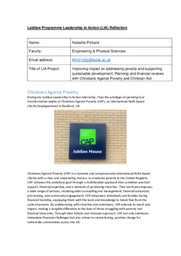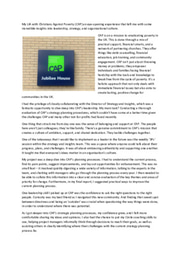Project Proposal - Striking the social balance: Analysing the societal impact the implementation of FinTech can have on Community Development Financial Institutions

The synergy of the social impact these organisations have, alongside the current conversation regarding how sector sustainability can realistically be reached, inspired me to choose my research project which will analyse the specific role FinTech can have as a factor of advancement to CDFI sector sustainability.
In weeks 1 and 2 of this project, a review of recent organisational and government reports, as well as impact investing websites, will be undertaken in order to develop sector and process knowledge. These actions will provide the foundational knowledge of this sector for me to draft the overview and context sections of the final report as well as a literature review. This work hopes to enable me to compare analysis methods used by CDFI’s adopting manual underwriting compared to those utilising FinTech. It also aims to identify the key differences in the economic impacts of these two business models.
Weeks 3 and 4 will involve both qualitative and quantitative analysis from existing reports and impact investing websites as well as conducting interviews with organizational managers and potentially policymakers in government or councils. These will involve guided discussions which will be planned in order to investigate organisations' current impact and credit-risk analysis methods, plus their future business plans.
In weeks 5 and 6 the analysis and reporting will be undertaken with data sampling from the research interviews and the Thematic analysis of the qualitative data. The comparisons of several factors from the different business models will be made possible through the data analysis performed. From this work, conclusions will be formed as part of the summary of the report regarding the different economic impacts of CDFI's using automated vs manual underwriting.
This report will state the findings of the project, suggest potential explanations for the findings based on specialist knowledge developed and economic theory, and provide informed suggestions as to how organisations with different business models can collaborate to increase efficiency, social impact and sector stability.
One of the proposed outcomes of this project will be enabling industry managers to make informed decisions regarding the allocation of future investments and changes to business models. By identifying credit-analysis processes which present the opportunity for FinTech to be implemented, this project would inject valuable knowledge into a heavily grant-funded sector regarding alternative delivery mechanisms. This will give insight as to how a larger proportion of the current gap caused by market failure can be overcome and how the necessary gaps can be bridged by the agility of the CDFI sector. FinTech is a technological innovation that delivers financial services through automated processes, therefore the adoption of automated lending in this sector has the potential to increase social impact by increasing efficiency.
By presenting the comparison of social impacts between CDFI’s adopting FinTech vs those undertaking credit-risk analysis by manual methods, I hope to encourage future partnerships amongst CDFI’s and between CDFI’s and FinTech lenders to result in increased efficiency in this sector. This will enable CDFI’s to work towards sector sustainability and would directly impact the communities these organisations serve.
A by-product of this project will be the social and community impact. Due to the social goals of CDFI’s, being predominantly supporting the financial wellbeing of the most vulnerable in society, this project will inform plans to increase efficiency and capacity to service larger geographical coverage, thereby enabling more disadvantaged people to access the much-needed funding these organisations provide. In turn, this will generate jobs and reduce social inequalities for more people.





Please sign in
If you are a registered user on Laidlaw Scholars Network, please sign in